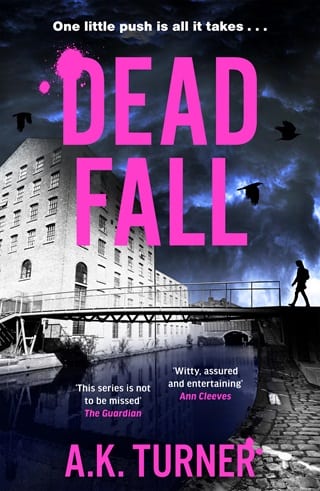Chapter Six
In the reception area Bronte's mother and father looked like a tableau of an estranged couple. Chrysanthi Angelopoulos sat in one corner, as far as it was possible to be from her ex-husband, George, who'd taken the other corner, elbows on his thighs and head in his hands.
As Cassie greeted them, they both struggled to focus on what she was saying, their expressions grief-dazed, still in the zombie-like state inhabited by the just-bereaved: the death of their only daughter not yet a reality.
Minutes later, in the viewing room Chrysanthi stood on the other side of Cassie from George, using her as a buffer zone. None of this came as a surprise: Cassie had seen time and again how sudden, unexpected death could magnify emotions and resurrect long-simmering resentment. She'd even seen grieving relatives throw punches at each other.
Keeping her voice low and matter-of-fact, she prepared them for how Bronte, currently behind curtained glass doors, would look, making eye contact and using the opportunity to check each of them out. She'd thought at first that they were both in their mid-fifties, but now, seeing Chrysanthi's barely lined face and clean jawline in close-up, she decided she was probably only in her forties – perhaps fifteen years younger than her ex? It was her clothes and the vibe she gave off that put years on her: a dowdy calf-length black dress that hid her shape and sturdy, ‘sensible' shoes. She put Cassie in mind of a Greek lady of a previous generation – the kind you might glimpse through the kitchen door of a taverna, or making her way to church in a tiny mountain village.
After ensuring that they were both ready, she pulled the cord to open the curtains covering the glass doors to the anteroom where their daughter lay.
She had arranged Bronte to be viewed in profile, showing her undamaged right side; the coverlet covering her slender body to just below the chin to hide the midline stitching. Chrysanthi's hand shot out, flattening her palm against the glass, a primal gesture.
‘Would you like to go in?' asked Cassie gently. Getting a fierce nod in reply.
George – blank-faced, shell-shocked – followed them inside. Chrysanthi immediately took Bronte's right hand, milk-white against the deep red of the coverlet, and bent down so that their heads were almost touching. Chafing the dead hand between hers like she could warm it, she started speaking softly in mellifluous Greek, as if comforting a crying child.
The beautiful words fell on Cassie's ear like music, and she found she could make out a handful of them which had survived the metamorphosis from ancient to modern Greek.
Agape meant beloved; she couldn't recall what hamartia meant.
Cassie had got her science A levels at evening classes, but after starting work as a mortuary technician had discovered that ninety-five per cent of anatomical and medical terms were rooted in the classical languages. And so she'd signed up for a final A level in Classics, and was still learning Latin and Greek, for their beauty as much as their practical value. Like coracoid – the Greek name for the hook-like process on the shoulder bone – named for the crooked beak of the crow. Or raven.
Turning to George, Cassie sought his eyes: most men found it harder to express emotion but that didn't mean they weren't suffering: if anything it probably made it worse. He swiped at his eyes, took a shuddering breath. ‘She was my life,' he said, lifting his hand and letting it fall, a hopeless gesture.
The saddest thing to Cassie was that he and Chrysanthi wouldn't be able to comfort one another or share memories of their daughter.
‘When can we bury her?' asked George, taking refuge in the practical. He was tall like his wife and had clearly been handsome when he was young – was still good-looking, with a full head of dark hair silvered attractively at the temples. Unlike his wife, he was dressed unshowily but stylishly, in a well-cut dark blue jacket with a shirt and tie underneath. Cassie knew he was a successful businessman who'd also acted as his daughter's manager, so he must have been used to hanging out with music industry types.
‘The pathologist will advise the coroner of the provisional cause of death,' she told him. ‘And if there's nothing untoward she will release the body.'
George frowned. ‘Untoward? But Sophia .?.?. took her own life?' His voice becoming hoarse on the last words.
‘As you know the police found what appeared to be drugs at your daughter's flat and the lab is conducting blood tests.' Cassie hesitated. ‘I'm afraid the results might take .?.?. a while.' Or more likely months, on a routine PM . ‘The coroner needs to know if the balance of Sophia's mind was disturbed before an inquest can be held.'
Chrysanthi's head jerked up, fixing her ex-husband with a look of hatred so intense it took Cassie aback. ‘This is your fault !' she hissed. ‘It was you who kept on at her to sing, filling her head with record contracts and getting famous, just so you could get some of the glory' – her Greek accent surfacing in her fury.
George just stood there mute, probably knowing that responding would only make it worse.
Chrysanthi wasn't done. ‘My little girl was too .?.?. fragile for that world.' She pointed a finger at her ex, a look of hatred on her face so implacable it was frightening. ‘God might forgive you your sins, Georgios Angelopoulos, but I promise you, I never will .'
 Fullepub
Fullepub 



